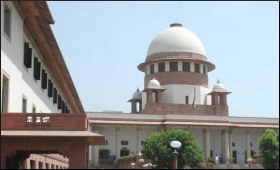|
|
|

|
Previous dues of electricity can be recovered from auction purchasers, rules SC
|
|

|
|
| Top Stories |
 |
|
|
|
IANS | 25 May, 2023
The Supreme Court has ruled that electricity dues of the previous owner
of a property can be recovered from an auction purchaser or the
subsequent owner.
A bench headed by Chief Justice of
India D.Y. Chandrachud and comprising Justices Hima Kohli and P.S.
Narasimha said: "A condition enabling the distribution licensee to
insist on the clearance of the arrears of electricity dues of the
previous consumer before resuming electricity supply to the premises is
valid and permissible under the scheme of the 2003 Act (Electricity Act
2003)".
The apex court was examining the issue raised in a batch
of appeals, whether the arrears of unpaid electricity dues outstanding
from the erstwhile owner can be claimed from the subsequent owner, who
has acquired the property in proceedings initiated to enforce mortgages
or to pay off the dues of creditors.
The electric utilities had
argued that the duty to supply electricity under Section 43 of the 2003
Act is not absolute and in case, there are outstanding dues of the
previous owner, they are entitled to refuse a new connection or decline
to commence the supply of electricity until the dues owed by the
previous owner are cleared.
On the contrary, the auction
purchasers have urged that Section 43 obligates the distribution
licensees to supply electricity when demanded by the auction purchaser.
It was argued that the provisions of the Electricity Act 1910 and the
Electricity (Supply) Act 1948, do not empower the electricity board to
recover the electricity dues of the previous owner or occupier from the
new owner or occupier of such premises and the liability to pay
electricity dues is only on the person to whom the supply of electricity
is made.
The bench noted that the duty to supply electricity
under Section 43 is only with respect to the owner or occupier of the
premises, and not the premises, as it is the owner or occupier who has
the statutory right to "demand" electricity for the premises under their
use or occupation.
"Further, it is the applicant who has to
fulfil all the statutory conditions laid down under the 2003 Act to
become entitled to get supply of electricity to their premises. The
applicant has to pay the necessary charges and comply with all terms and
conditions as determined by the appropriate commission for the supply
of electricity," it said.
The bench said: "The duty to supply
electricity under Section 43 is with respect to the owner or occupier of
the premises. The 2003 Act contemplates a synergy between the consumer
and premises. Under Section 43, when electricity is supplied, the owner
or occupier becomes a consumer only with respect to those particular
premises for which electricity is sought and provided by the electric
utilities".
Chief Justice Chandrachud, who authored the 179-page
judgment on behalf of the bench, said: "For an application to be
considered as a 'reconnection', the applicant has to seek supply of
electricity with respect to the same premises for which electricity was
already provided. Even if the consumer is the same, but the premises are
different, it will be considered as a fresh connection and not a
reconnection."
The bench noted that the duty to supply
electricity under Section 43 of the 2003 Act is not absolute, and is
subject to the such charges and compliances stipulated by the electric
utilities as part of the application for supply of electricity. "A
condition of supply enacted under Section 49 of the 1948 Act requiring
the new owner of the premises to clear the electricity arrears of the
previous owner as a precondition to availing electricity supply will
have a statutory character," said the bench.
The bench noted that
Electricity Supply Code providing for recoupment of electricity dues of
a previous consumer from a new owner have a reasonable nexus with the
objects of the 2003 Act. It said the implication of the expression "as
is where is" basis is that every intending bidder is put on notice that
the seller does not undertake responsibility in respect of the property
offered for sale with regard to any liability for the payment of dues,
like service charges, electricity dues for power connection, and taxes
of the local authorities.
Concluding the judgment, the Chief
Justice said: "In the exercise of the jurisdiction under Article 142 of
the Constitution, the electric utilities have been directed in the facts
of cases before us to waive the outstanding interest accrued on the
principal dues from the date of application for supply of electricity by
the auction purchasers".
In the judgment passed on May 19, the apex court decided 19 cases, which were pending adjudication for close to two decades.
|
|
|
| |
|
|
|
|
|
|
|
|
|
|
|
|
|
|
| |
| Customs Exchange Rates |
| Currency |
Import |
Export |
US Dollar
|
₹91.35
|
89.65 |
UK Pound
|
₹125.3
|
₹121.3 |
Euro
|
₹108.5
|
₹104.85 |
| Japanese
Yen |
₹58.65 |
₹56.8 |
| As on 19 Feb, 2026 |
|
|
| Daily Poll |
 |
 |
| What is your primary "Make or Break" expectation from the Finance Minister this year? |
|
|
|
|
|
| Commented Stories |
 |
|
|
|
|
|
| |
|